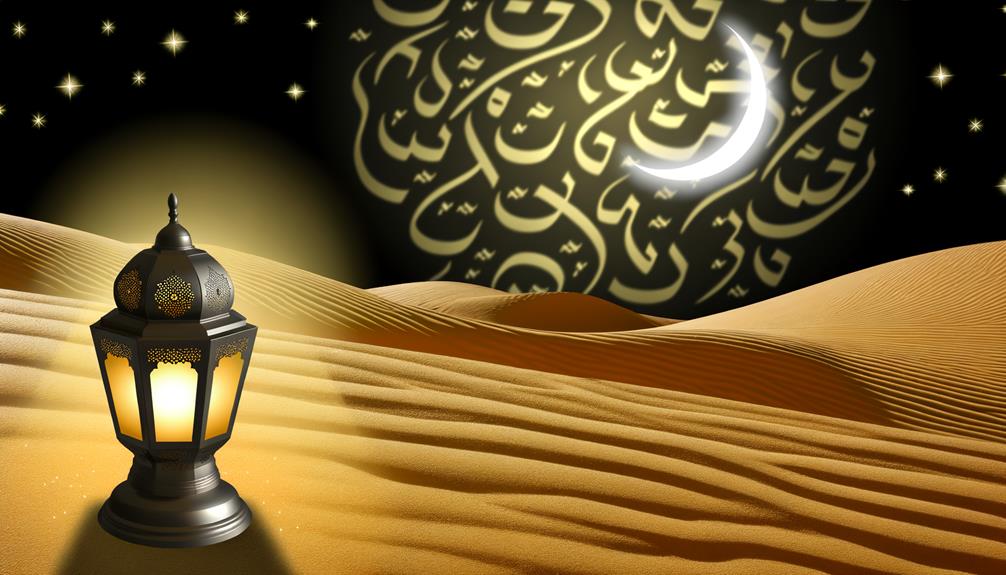Arabic Name Meaning in Urdu
Arabic names carry deep Islamic roots and blend seamlessly with Urdu. Popular names like Ali (علی) meaning 'elevated' and Fatima (فاطمہ) symbolize historical and religious reverence, easily translating into Urdu.
Unisex names like Noor (نور) mean 'light,' resonating with spiritual themes. These names are not only easy to pronounce in Urdu but also hold significant cultural and religious weight.
By choosing an Arabic name, you're embracing a rich heritage and timeless values. Explore further to discover the profound meanings Arabic names offer in an Urdu context, reflecting both tradition and faith.

Key Takeaways
- Arabic names like Ali, Omar, and Hassan have meanings in Urdu reflecting elevation, flourishing, and goodness.
- Female names such as Aisha, Sara, and Fatima mean life, princess, and captivating in Urdu.
- Unisex names like Noor, Sami, and Iman translate to light, noble, and faith in Urdu.
- Arabic names blend well with Urdu due to phonetic and script similarities, making them easy to pronounce.
- Arabic names carry Islamic significance, resonating deeply within Urdu-speaking Muslim communities.
Historical Origins of Arabic Names
To truly understand Arabic names, you must explore their historical origins, which are deeply intertwined with Islamic culture and the Arabic language.
Arabic names often reflect the rich history and profound cultural heritage of the Arab world. You'll find that many names are derived from classical Arabic, reflecting virtues, qualities, or historical figures.
Names like 'Ahmad' (احمد) mean 'most commendable,' while 'Fatimah' (فاطمة) signifies 'one who weans.' These names aren't just labels; they embody aspirations and values.
By examining the historical context, you can grasp the deep significance behind each name, gaining insight into the cultural and linguistic richness of the Arabic-speaking world.
This understanding fosters a deeper connection to the names' origins and meanings.
Religious Significance
Arabic names hold profound religious significance, often drawing from the Quran and Hadith to reflect Islamic values and beliefs. When you choose a name like Muhammad (محمد) or Aisha (عائشة), you're embracing attributes of revered figures in Islam. These names don't just identify; they convey virtues such as faith, wisdom, and strength.
In Urdu, the meanings are equally rich. For instance, Muhammad means 'praised' and Aisha translates to 'alive' or 'living'. Understanding these names in their religious context offers a deeper appreciation of their importance.
When selecting an Arabic name, consider its spiritual connotations, ensuring it resonates with the values and teachings of Islam, enriching your cultural and religious heritage.
Popular Male Names
Frequently chosen for their deep meanings and cultural resonance, popular male names like Ali (علي) and Omar (عمر) offer a blend of historical significance and modern appeal.
Ali, meaning 'elevated' or 'high,' is revered for its association with the fourth caliph of Islam.
Omar, meaning 'flourishing' or 'long-lived,' holds a legacy tied to the second caliph.
These names aren't just popular but carry profound cultural and spiritual weight.
- Ali (علي)
- Meaning: Elevated, high
- Cultural Significance: Fourth caliph of Islam
- Omar (عمر)
- Meaning: Flourishing, long-lived
- Cultural Significance: Second caliph of Islam
- Hassan (حسن)
- Meaning: Handsome, good
- Cultural Significance: Grandson of Prophet Muhammad (PBUH)
Understanding these names reveals layers of history and reverence.
Popular Female Names
Now, let's explore popular Arabic female names and their profound meanings in Urdu.
You'll find names like Aisha, meaning 'alive' or 'living', and Sara, which translates to 'princess' or 'noble lady'.
Each name carries rich cultural heritage and resonates deeply within the Urdu-speaking community.
Common Female Names
Many beloved female names in Arabic, such as Aisha, Fatima, and Layla, carry profound meanings in Urdu, reflecting cultural and historical significance. You'll find that each name encapsulates a unique narrative and cultural essence.
- Aisha (عائشہ): This name means 'living' or 'life'. It evokes the memory of Aisha bint Abi Bakr, a revered figure in Islamic history.
- Fatima (فاطمہ): This name signifies 'captivating' or 'one who abstains'. It's associated with Fatima Zahra, the daughter of Prophet Muhammad (PBUH).
- Layla (لیلیٰ): Meaning 'night,' this name is often linked with romantic and poetic themes, resonating deeply in both classical and modern literature.
Understanding these names enhances your appreciation of their profound cultural roots.
Names With Deep Meanings
You'll discover that names like Zainab (زینب), Huda (ہدی), and Samira (سمیرہ) encapsulate profound meanings, each reflecting rich cultural and historical narratives in Urdu and Arabic contexts.
Zainab, often associated with beauty and grace, holds significant historical importance as the name of Prophet Muhammad's daughter.
Huda means 'guidance' in both Arabic and Urdu, symbolizing enlightenment and wisdom.
Samira translates to 'entertaining companion' or 'evening conversationalist,' embodying warmth and sociability.
These names aren't just identifiers but carry deep-seated values and traditions. Understanding the meanings behind these names enriches your appreciation of their cultural resonance, connecting you to a broader historical and linguistic heritage.
Unisex Names
In Urdu, unisex Arabic names like 'Noor' and 'Sami' carry significant cultural and spiritual meanings, making them popular choices for both boys and girls. These names are deeply rooted in Islamic tradition and convey universal values of light, strength, and serenity.
These names are deeply rooted in Islamic tradition and convey universal values of light, strength, and serenity.
- Noor (نور): This name means 'light' and symbolizes guidance, purity, and divine illumination.
- Sami (سامی): Translating to 'elevated' or 'sublime,' Sami reflects qualities of nobility and high status.
- Iman (ایمان): Meaning 'faith' or 'belief,' Iman is a powerful name that connotes spiritual conviction and trust.
You'll find these names bridging cultural gaps, offering both heritage and modern appeal. Their dual-gender flexibility adds to their widespread acceptance.
Modern Trends
You'll notice that popular Arabic names like Ayaan and Zain have gained significant traction in Urdu-speaking communities.
Modern naming practices are now embracing both traditional and contemporary influences, reflecting a blend of cultural heritage and current trends.
Understanding these shifts can provide meaningful insights into evolving identity expressions.
Popular Arabic Names
Many contemporary Arabic names, like Zaina and Rafi, reflect a blend of traditional values and modern appeal, resonating deeply within both Arabic and Urdu-speaking communities. You'll find these names carry rich meanings and cultural significance.
For instance, Zaina means 'beautiful' in Arabic, a term cherished in both cultures. Rafi, meaning 'exalted' or 'noble,' carries a sense of dignity and respect.
Consider the following popular names:
- Aisha: Meaning 'alive' or 'living,' Aisha is favored for its historical and spiritual connotations.
- Amir: Translating to 'prince' or 'commander,' this name denotes leadership and strength.
- Layla: Signifying 'night,' Layla is celebrated for its poetic and romantic undertones.
These names encapsulate modern trends while maintaining their timeless essence.
Emerging Naming Practices
Amidst evolving cultural dynamics, emerging naming practices in Arabic and Urdu communities showcase a fascinating blend of innovation and tradition. You'll notice parents increasingly choosing names that reflect both cultural heritage and modern sensibilities.
For instance, names like Zayn (زین) and Aaliyah (عالیہ) bridge classical roots and contemporary appeal. Additionally, bilingual names are rising in popularity, accommodating both Arabic and Urdu pronunciations, such as Noor (نور) and Yasir (یاسر).
Parents are also drawn to names with aspirational meanings, emphasizing virtues like wisdom, strength, and beauty. These trends highlight a keen awareness of cultural identity while embracing global influences.
Understanding these practices offers valuable insight into the evolving landscape of personal identity in these vibrant communities.
Cultural Impact
Arabic names hold profound cultural significance in Urdu-speaking communities, bridging historical ties and linguistic heritage. You'll notice how these names convey a deep sense of identity and belonging. They often reflect:
- Historical Legacy: Names like 'Fatima' or 'Hussain' evoke rich historical narratives, connecting individuals to Islamic history.
- Linguistic Harmony: These names seamlessly integrate into the Urdu language, making them a natural fit culturally and linguistically.
- Religious Reverence: Many Arabic names are derived from Islamic texts, infusing them with spiritual meaning and reverence.
Understanding these aspects helps you appreciate the layered cultural impact Arabic names have within the Urdu-speaking world. They're not just labels but carriers of rich history and tradition, blending seamlessly with Urdu's linguistic fabric.
Conclusion
In exploring Arabic names' meanings in Urdu, you've traversed rich historical origins, religious significance, and modern trends.
Did you know that around 60% of Arabic names have deep-rooted religious connections? This statistic highlights the cultural and spiritual depth these names carry.
By understanding these nuances, you gain bilingual fluency and cultural insight, enriching your appreciation for each name's unique legacy.
Embrace this knowledge, and you'll connect more profoundly with the rich tapestry of both languages.






